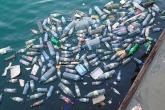New EFRA inquiry into circular economy starts by targeting plastic waste
Parliamentary backbench committee will examine progress towards resource efficiency with an initial focus on the Global Plastics Treaty, ahead of August INC-5.2 talks.
 The Environment, Food and Rural Affairs (EFRA) Committee has announced a new inquiry into the progress the UK is making into its transition to a circular economy.
The Environment, Food and Rural Affairs (EFRA) Committee has announced a new inquiry into the progress the UK is making into its transition to a circular economy.
The long-term investigation will review the government’s progress in implementing sustainable waste management policies to meet its Environment Improvement Plan, with an initial focus on the Global Plastics Treaty negotiations.
The committee has stated its intention to call for evidence regularly and produce focused reports throughout the duration of the inquiry, with the first round of questions targeting the UK contribution to the upcoming Intergovernmental Negotiating Committee (INC-5.2) negotiations scheduled for 5-14 August 2025 in Geneva, Switzerland.
Inquiry spans full circular economy from design to disposal
The committee has outlined a range of topics for scrutiny during the inquiry, with key areas under investigation including Extended Producer Responsibility, Deposit Return Scheme, simplified recycling systems, and the Plastic Packaging Tax.
The inquiry will examine efforts to reduce single-use items, promote ecological product design, and enhance international cooperation on waste exports.
Additional focus areas include encouraging sustainable product imports, developing domestic reuse, repair, and recycling industries, and creating circular economy frameworks across different sectors, including agriculture and organic wastes such as food.
The environmental impact of landfill and incineration, along with strategies to combat waste crime, will also be investigated.
Explaining the scope of the review, Chair of the EFRA Committee, Alistair Carmichael MP, said: “Plastic pollution is just one symptom of the broader problem of our linear economy, which is causing environmental damage as well as economic waste. In this broad inquiry, we will scrutinise efforts to bring about a more circular economy and progress on developing circular economies across different sectors, including agriculture and organic wastes such as food.”
Global Plastics Treaty tops committee’s agenda
The committee’s initial focus on the Global Plastics Treaty comes about the failed November 2024 INC-5 talks in South Korea, which have necessitated another round of negotiations.
EFRA plans to hold an evidence session on plastic pollution in July 2025, examining key elements of the proposed treaty, assessing UK leadership on the issues, and identifying barriers to achieving agreement in the August talks.
Carmichael added: “The growth of plastic pollution has been a blight on our shores for decades. It is a global issue that requires international cooperation. Ahead of the negotiations in August, our Committee will look at how the Government could take a lead on this and what a successful outcome from the talks would look like.”
As such, the committee has issued a specific call for evidence regarding the Global Plastics Treaty, with submissions due by 18 June 2025. Stakeholders are asked to address five key questions:
- What were the main reasons for the INC-5 talks in November 2024 failing to reach agreement on a Global Plastics Treaty?
- What are the main areas of agreement and divergence between parties?
- How might remaining areas of disagreement be overcome at INC-5.2 in August 2025?
- What would represent a successful outcome, and what are the prospects for this?
- What can the UK Government do to demonstrate leadership and drive ambition with regards to the proposed Treaty?
The evidence gathered will inform the committee’s examination of the treaty process and shape recommendations for the UK’s approach to the negotiations in August. Following this initial focus on the Global Plastics Treaty, the committee plans to expand its investigation to cover the broader aspects of circular economy development in the UK.
Commenting on the announcement, Diane Crowe, Group Sustainability Director at Reconomy, said: “We welcome the EFRA Committee’s decision to examine the UK’s circular economy progress. The global economy remains overwhelmingly linear, with just 6.9 per cent of resources making their way back into the economy.
“Addressing this requires bold reform, industry cooperation, and urgent action across supply chains.”








